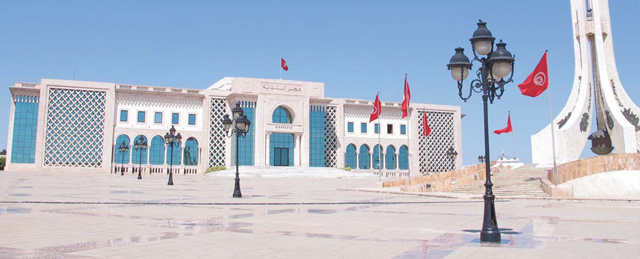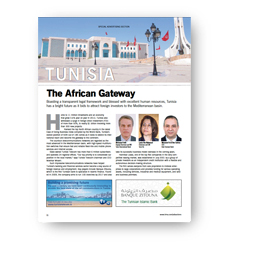Boasting a transparent legal framework and blessed with excellent human resources, Tunisia
has a bright future as it bids to attract foreign investors to the Mediterranean basin.
ome to 11 million inhabitants and an economy
that grew 3.6% year on year in 2012, Tunisia also
witnessed a surge in foreign direct investment (FDI)
of more than 50%, to nearly $1 billion involving more
than 300 new projects.
Ranked the top North African country in the latest
Ease of Doing Business Index compiled by the World Bank, Tunisia’s
overall position of 50th out of 185 comes as it looks to extend its international
reach and become the gateway to the continent.
The country’s telecommunications networks are regarded as the
most advanced in the Mediterranean basin, with high-speed multifunction
switches that ensure fast and reliable fixed-line and mobile phone
services and Internet access.
State-owned Tunisie Telecom has more than 6 million subscribers
and operates 24 regional offices. “Our top priority is to consolidate our
position in the local market,” says Tunisie Telecom chairman and CEO
Mokhtar Mnakri.
Such impressive telecommunications networks have helped
Tunisia’s banking and financial services sector become a key source of
foreign revenue and employment. Key players include Banque Zitouna,
which is the first Tunisian bank to specialize in Islamic finance. Founded
in 2009, the company aims to run 100 branches by 2017 and also take its successful business model overseas in the coming years.
Hannibal Lease, one of the top five companies in the very competitive
leasing market, was established in July 2001 by a group of
private investors as an independent credit institution with a flexible and
autonomous decision-making structure.
The firm serves everyone from sole proprietors to midsize enterprises
to large corporations and provides funding for various operating
assets, including vehicles, industrial and medical equipment, and land
and business premises.
To ensure that its customers receive fast and efficient service, Hannibal
Lease has gradually expanded its branch network in the search
for even greater customer satisfaction. The company now operates
several agencies in different parts of Tunisia and attaches particular
importance to business ethics, namely respect for the client, confidentiality,
professionalism, rigor and consistency in the quality of service.
Tunis International Bank, part of the Kuwait Projects Company
(Holding) Group, more commonly known as KIPCO, is an offshore bank
and boasts the capacity and liquidity to fund important projects of
foreign companies based in Tunisia. Its managing director is Mohamed
Fekih. Arab Tunisian Bank, meanwhile, run by CEO Mohamed Ferid
Ben Tanfous, operates 120 branches and focuses its development on
a strategic vision based on efficiency, innovation, quality of service,
proximity, new technologies and improvement of human resources.
The only homegrown reinsurer in the country, Tunis Re works in a
very competitive market. Founded in 1981, Tunis Re has gone from
strength to strength and is seeking an international partner to take advantage
of further lucrative business opportunities across the continent.
“Tunis Re is a platform for North Africa, however we want to
become the continent’s reinsurer, which is why we are looking for a
strategic partner for 2014,” explains the company’s chairman and
general manager, Lamia Ben Mahmoud.
Banque de Tunisie is not only the oldest bank in Tunisia with roots
stretching back nearly 130 years, but it is also the most important,
with an 8% share of the market—ideal for its sustainable growth
strategy. Banque de Tunisie president Mohamed Habib Ben Saad says:
“Our ratios are extremely strong—the Central Bank requires a ratio of
nine and we are already at 19, so there is no comparison. We have all
the resources and assets to support national economic development.
We are present in all the subsectors. Our services to individuals are
25% of our portfolio, and we are very active in commercial loans and
present in agriculture. We are in every corner of Tunisia.”
Finance Minister Elyes Fakhfakh says Tunisia’s economic outlook
looks very bright. “We are in a process of transition—the base is
solid, the risk is now behind us,” he says. “We are entering a phase of
sustainability, which is the most important for the investor. Tunisia has
a bright future ahead.”


